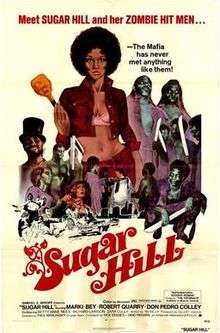Sugar Hill (1974 film)
| Sugar Hill | |
|---|---|
 Theatrical release poster | |
| Directed by | Paul Maslansky |
| Produced by | Elliot Schick |
| Written by | Tim Kelly |
| Starring | |
| Music by | Nick Zesses and Dino Fekaris |
| Cinematography | Robert Jessup |
| Edited by | Carl Kress |
Production company | |
| Distributed by | American International Productions |
Release date |
|
Running time | 91 minutes |
| Country | United States |
| Language | English |
| Budget | $350,000 |
Sugar Hill is a 1974 American horror blaxploitation zombie film released by AIP. It starred Marki Bey as the title character who uses voodoo to get revenge on the people responsible for her boyfriend's death. The zombies in this film more closely resemble the creatures of voodoo legend - i.e., the walking dead who do the bidding of a human master - than the flesh-eating "living dead" ghouls popularized by George A. Romero. According to the film, the zombies are the preserved bodies of slaves brought to the United States from Guinea.[1] American International Pictures had previously combined the horror and blaxploitation genres with Blacula (1972) and its sequel, Scream Blacula Scream (1973).
Plot
The story centers on Diana "Sugar" Hill (Bey), a photographer whose boyfriend, nightclub owner Langston (Larry D. Johnson), has been killed by mob boss Morgan (Robert Quarry) and his men when he refused to sell the club to Morgan. Sugar seeks the help of a former voodoo queen named Mama Maitresse (Zara Cully) to take revenge on Morgan and his thugs. Mama summons the voodoo lord of the dead, Baron Samedi (Don Pedro Colley), who enlists his army of zombies to destroy the men who killed Langston and now want the club. Investigating the killings is Sugar's former boyfriend, police Lt. Valentine (Richard Lawson).
Cast
- Marki Bey as Diana Hill
- Robert Quarry as Morgan
- Don Pedro Colley as Baron Samedi
- Betty Anne Rees as Celeste
- Richard Lawson as Valentine[2]
- Zara Cully as Mama Maitresse
- Charles P. Robinson as Fabulous
- Larry D. Johnson as Langston
- Rick Hagood as Tank Watson
- Ed Geldart as O'Brien
- Albert J. Baker as George
- Raymond E. Simpson, III as King
- Thomas C. Carroll as Baker
- Big Walter Price as Preacher
- Charles Krohn as Captain Merrill
- J. Randall Bell as Parkhurst
- Peter Harrell, III as Police Photographer
- Judy Hanson as Masseuse
- Gary W. Chason as Lab Technician
- Roy L. Downey as Stevedore
- Garrett Scales as Crew Chief
- John E. Scarborough as Uniformed Cop
Production
The film, budgeted at $350,000,[3] was shot on location in Houston at such locations as the Heights branch of the Houston Public Library (a historical landmark), used in the film as a "Voodoo Institute". Sugar Hill was the last film Quarry did for AIP, after a run that included the Count Yorga movies. Also appearing in the film was Cully, who played Mama Jefferson on the TV show The Jeffersons. Charles P. Robinson, known for his role as Mac Robinson on NBC's Night Court, portrayed the character of Fabulous. Hank Edds created the makeup effects for the zombies in the film.[1]
Release
The film was released theatrically in the United States by American International Pictures in February 1974.[4] It was cut to 83 minutes for television and retitled The Zombies of Sugar Hill.[5]
The film was released on VHS by Orion Home Video in 1996.,[6] and on DVD in October 2011 as part of MGM's Limited Edition series.[7]
Reception
Writing in The Zombie Movie Encyclopedia, academic Peter Dendle called it "a humorously dated blaxploitation feature" whose zombies "represent a throwback to the classic zombie conceptualization of the '30s and '40s".[8] Adam Tyner of DVD Talk rated it 4 out of 5 stars and wrote, "Creepy, sexy, sleazy, and a borderline-surreal amount of fun, Sugar Hill is a perfect movie for a Halloween marathon and probably my single favorite blaxploitation flick, period".[7]
In popular culture
Rapper MF Doom sampled several audio clips from the film under his alias King Geedorah on the album Take Me to Your Leader (2003).
References
- 1 2 Kay, Glenn (2008). Zombie Movies: The Ultimate Guide. Chicago Review Press. p. 86. ISBN 978-1-55652-770-8.
- ↑ Torriano, Berry (2007). Historical dictionary of African American cinema. Scarecrow Press. p. 207. ISBN 978-0-8108-5545-8.
- ↑ Samuel Z Arkoff & Richard Turbo, Flying Through Hollywood By the Seat of My Pants, Birch Lane Press, 1992 p 202
- ↑ Hamm, Sam (February 26, 1974). "Southern-Fried Honky Meets Tough Black Fox". The Cavalier Daily.
- ↑ Maltin, Leonard (2008). Leonard Maltin's 2009 Movie Guide. Penguin. p. 1338. ISBN 978-0-452-28978-9.
- ↑ "Sugar Hill (VHS tape, 1996) [WorldCat.org]". Retrieved 31 December 2011.
- 1 2 Tyner, Adam (2011-10-23). "Sugar Hill (1974)". DVD Talk. Retrieved 2015-02-14.
- ↑ Dendle, Peter (2001). The Zombie Movie Encyclopedia. McFarland & Company. pp. 165–167. ISBN 978-0-7864-9288-6.
External links
- Sugar Hill on IMDb
- Sugar Hill at AllMovie
- Sugar Hill at the American Film Institute Catalog
- Sugar Hill at the TCM Movie Database